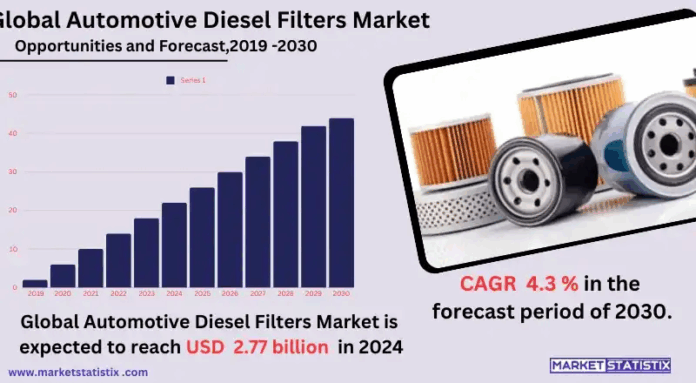Introduction to Automotive Diesel Filters
The global Automotive Diesel Filters Market is projected to grow at a compound annual growth rate (CAGR) of 4.3 % from 2024 to 2030. The market size is expected to reach approximately USD 2.77 billion by 2030.
What are Automotive Diesel Filters?
The Automotive Diesel Filters Market refers to the segment of the automotive industry dedicated to the production and distribution of filters designed for diesel engines. These filters — primarily diesel particulate filters (DPFs) and diesel fuel filters — remove contaminants like soot, ash, and debris from diesel exhaust gases and fuel, improving engine performance and reducing emissions.
Key Market Drivers
- Stricter Emission Regulations: Increasing global implementation of emission standards (e.g., Euro 6, BS-VI) fuels demand for high-efficiency diesel filters.
- Rising Commercial Vehicle Sales: Growing logistics and construction sectors drive diesel vehicle usage, boosting the need for filtration systems.
Emerging Trends
- Adoption of Regenerative Diesel Particulate Filters (DPFs): Advanced DPFs that self-clean through regeneration are gaining traction.
- Integration with Smart Sensors: Filters now include sensors to monitor clogging levels and optimize replacement cycles.
Opportunities
- Aftermarket Expansion: Increasing replacement needs due to vehicle aging presents growth in the aftermarket segment.
- Growth in Emerging Economies: Developing countries with expanding transportation and logistics sectors are significant growth zones.
Challenges
- Shift Toward Electric Vehicles (EVs): The global EV transition poses a long-term threat to diesel component markets.
- High Maintenance and Replacement Costs: Advanced filters can be expensive to maintain, especially in heavy-duty vehicles.
Demand and Key Developments
- High Demand from Commercial Fleets: Trucks, buses, and heavy-duty vehicles continue to depend heavily on diesel filters.
- Recent Developments: Development of low-ash DPFs for longer life, eco-friendly filter materials with recyclable components, and modular filter systems for easy retrofitting in older vehicles.
Why It Matters
- Environmental Impact: Diesel filters help meet environmental regulations by significantly reducing particulate emissions.
- Engine Longevity: Clean diesel fuel systems contribute to longer engine life and improved fuel efficiency.
- Public Health: Lower particulate matter emissions improve air quality and reduce health risks.
Frequently Asked Questions (FAQs)
- What are the types of diesel filters used in vehicles?
- Primarily diesel particulate filters (DPFs) for exhaust systems and fuel filters for removing impurities from diesel fuel.
- Are diesel filters mandatory in all vehicles?
- In most countries with emission regulations (e.g., EU, U.S., India), DPFs are mandatory in new diesel vehicles.
- How often should diesel filters be replaced or serviced?
- Depends on vehicle usage and type; DPFs often require cleaning or replacement every 100,000–150,000 km, while fuel filters may need replacing every 30,000–50,000 km.
- Can aftermarket filters affect vehicle performance?
- Yes, low-quality filters can reduce engine efficiency or fail to meet emission standards; OEM or certified aftermarket parts are recommended.
- What’s the market outlook?
- While long-term growth may be limited by EV adoption, near- to mid-term demand remains strong in commercial vehicle segments and emerging economies.
Conclusion
The Automotive Diesel Filters Market is poised for growth due to stricter emission regulations and increasing demand from commercial vehicle sectors. Despite challenges such as the shift towards electric vehicles, advancements in filter technology and growing demand in emerging economies are expected to drive the market forward. Understanding the importance of diesel filters in reducing emissions and improving engine performance highlights their critical role in the automotive industry. As the market continues to evolve, focusing on high-efficiency filters, aftermarket expansion, and adapting to regulatory changes will be key for industry players.

